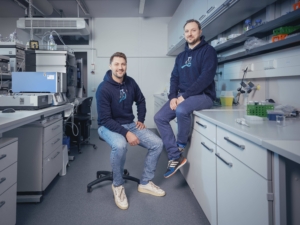
AMR: ENABLE selects Mutabilis candidate
A drug combo breaking antibiotic resistance of Gram-negative priority pathogens has been selected under the ENABLE programme of the Innovative Medicines Initiative (IMI).
Efficacy of beta-lactam antibiotics, which represent 65% of the antibiotics sold throughout the world, is increasingly challenged in Gram-negative bacteria by the rapid dissemination of beta-lactamase resistance genes responsible for fast in situ degradation of beta-lactams. New antibiotics that address this problem are urgently needed. A new oral combination treatment that might overcome beta-lactam / fluoroquinolone co-resistance has now been selected for accelerated preclinical development by the Portfolio Management Committee of ENABLE, a programme under the Innovative Medicines Initiative‘s (IMI) New Drugs 4 Bad Bugs (ND4BB) portfolio.
The oral cephalosporin/beta lactamase inhibitor combination, developed by French Mutabilis SA (Romainville/Paris), is designed to target complicated urinary tract infections (UTI) and acute pyelonephritis caused by E. coli, Klebsiella spp. and P. mirabilis. It consists of an oral cephalosporin prodrug plus MUT485, the prodrug of MUT350, a potent inhibitor of class A Extended-Spectrum Beta-Lactamases that restores the activity of the cephalosporin partner against resistant bacteria and reduces the risk of resistance development and thus might reduce the use of cabapenems. MUT 485 is a so-called Diazabicyclooctane (DBO) inhibitor that resists degradation by all known bacterial beta-lactamases. DBOs are non-natural mimics of beta-lactams.
According to Mutabilis, the combination treatment has the potential to become the first novel oral beta-lactam/beta-lactamase inhibitor combination since the introduction of Augmentin in 1981.
ENABLE has now met its goal to select two development candidates for the treatment of systemic Gram-negative infections by 2020 – the first candidate was the aminoglycoside Apramycin developed by Swiss Juvabis AG. Pierre Meulien, Executive Director of the Innovative Medicines Initiative, said: Identifying another promising potential candidate is a massive achievement and a tribute to the ENABLE team, who has combined their expertise to create an excellent platform for early stage antibiotic development. This also demonstrates the added value of the public-private partnership approach in tackling antimicrobial resistance.
In this battle against antimicrobial resistance, small and medium-sized enterprises (SMEs) such as Mutabilis are playing an increasing role. As highlighted by the Pew Charitable Trusts, over 90 percent of the antibiotics in development are pushed forward by small companies rather than large pharmaceutical companies. SME efforts are the backbone of AMR research, and with valuable EFPIA guidance we want to support their initiatives as best as we can, said Anders Karlén, Leader of the managing entity of ENABLE and Professor at Uppsala University.
In March, experts from SMEs, Big Pharma, regulatory authorities and funding agencies tackling the challenge of AMR will met in Basel to discuss the progress in the fields and will discuss bottlenecks in the field.


 SLAS - Alexandra Csuport Photography
SLAS - Alexandra Csuport Photography Phabioc GmbH
Phabioc GmbH